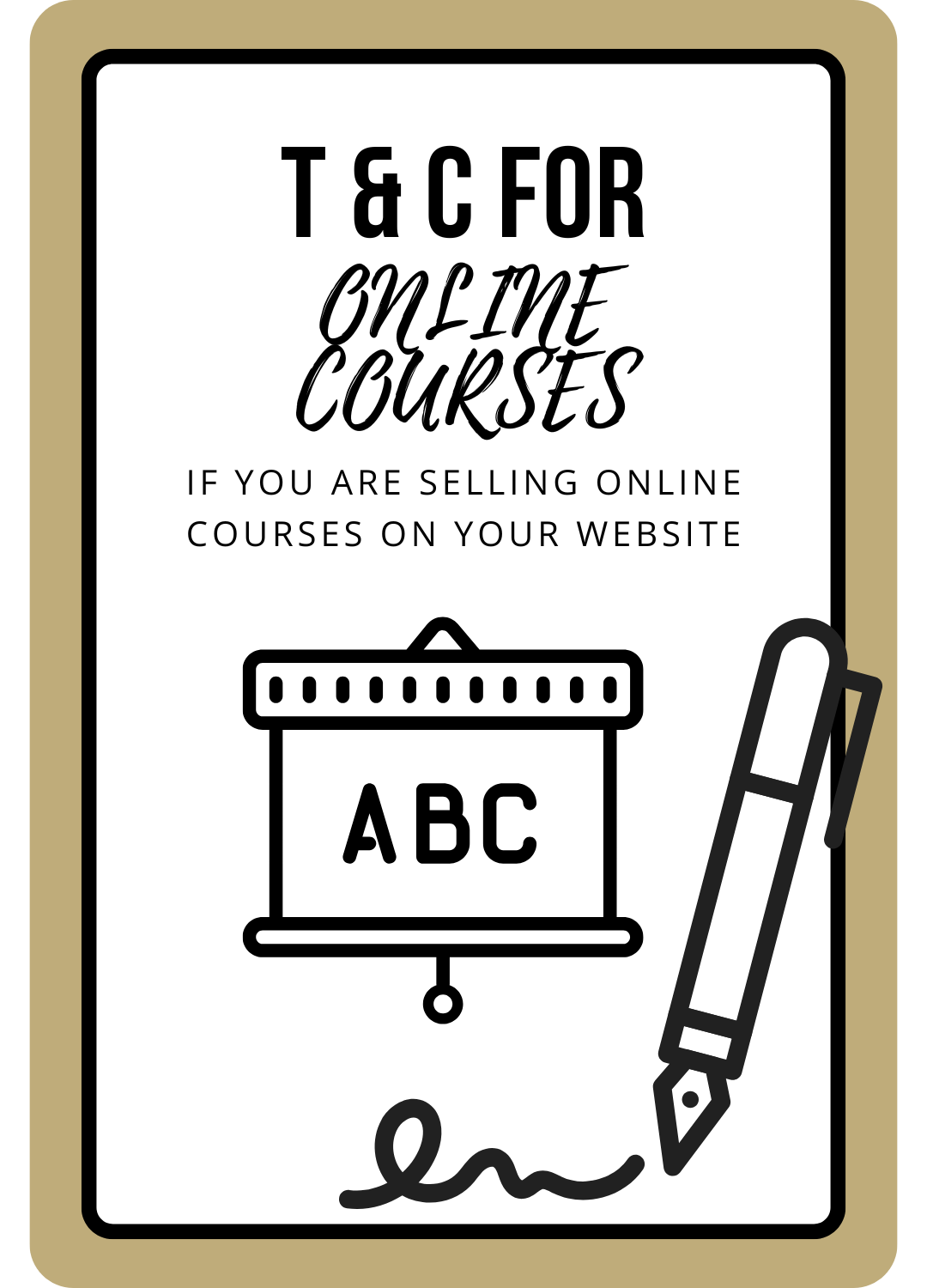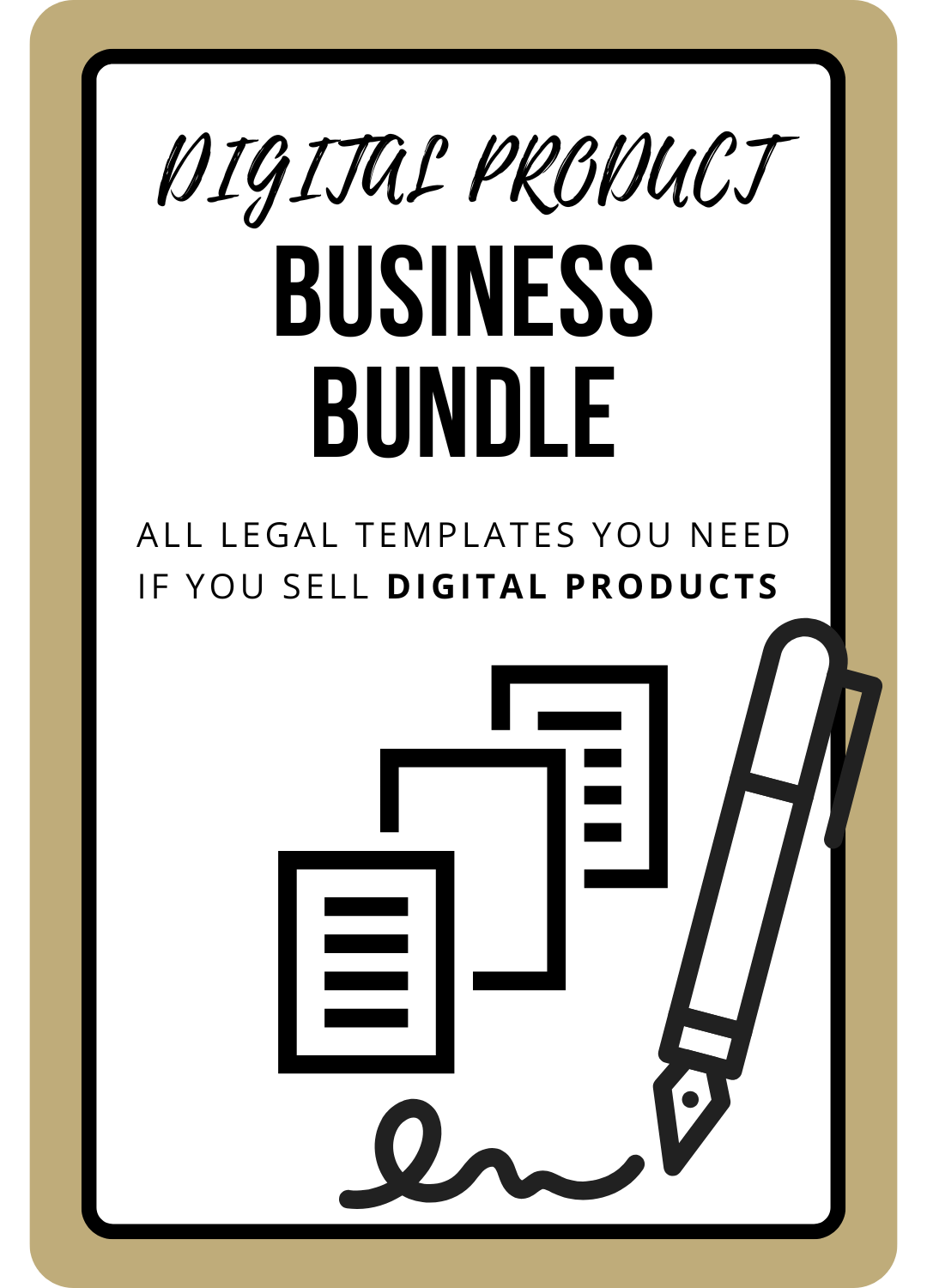10 Must-Have Disclaimers for Your Online Course Terms and Conditions (Protect Your Income & Content)
Are your online course terms and conditions truly protecting you? If not, you could face refund demands, content theft, or even legal trouble.
Selling an online course is exciting — it’s scalable, profitable, and a fantastic way to share your expertise with the world. But as a lawyer who has drafted countless terms and conditions for course creators, I’ve also seen the nightmare scenarios that happen when these legal protections are missing.
In this post, you’ll learn about 10 must-have disclaimers for your online course terms and conditions — plus niche-specific examples to include in your training course terms and conditions template — so you can protect your content, your income, and your business from costly disputes with your online course terms and conditions template.
By the end, you’ll know exactly how to prevent misunderstandings, manage student expectations, and avoid legal risks before they even start.
That’s why I created my Terms and Conditions for Online Courses Template — so you don’t have to spend hours figuring out the legal language yourself.
This post is all about the 10 disclaimers your online course terms and conditions need to keep you protected.
Ultimate Online Course Terms and Conditions
The 10 must-have disclaimers for your T&C or Contract for Online Courses
1. Errors Disclaimer
You’re human, and the world changes by the second — you can’t guarantee that every detail in your course will stay perfect and up-to-date forever.
Practical example: You teach Instagram marketing. A month after launch, the platform changes its algorithm, making one of your strategies outdated. Without an errors disclaimer, a student could claim your content is “wrong” and demand a refund.
An errors disclaimer in your online course terms and conditions ensures you can’t be held liable for mistakes, inaccuracies, or outdated information in your course content.
💡 Want a ready-made errors disclaimer? My Online Course Terms and Conditions Template includes it.
2. Access Disclaimer
Online courses are digital products, and you can’t control everything about how they function or how they’re accessed.
Practical example: Your hosting platform experiences a 48-hour outage. Without an access disclaimer, students might request compensation for the downtime. You could lose money over this!
An access disclaimer in your online course terms and conditions makes it clear you’re not responsible for issues beyond your control, like server downtime, software errors, or a student’s own tech or internet problems.
3. Description Disclaimer
Your sales page can’t show every detail of your course, and over time, you’ll likely update it to make it even better. But that could also result in a student not getting exactly what they expect based on your course overview on your website.
Practical example: You update your course and remove a bonus module. A past student complains it’s “not what they signed up for.”
Your online course terms and conditions should include a solid description disclaimer that sets expectations, stating that your course description is a general overview, not a binding guarantee of specific content or outcomes.
💡 Need an ironclad description disclaimer? My Online Course Terms and Conditions Template includes it.
4. Incompatibility Disclaimer
Not every student will have the same skills, background, or dedication — and it’s not your job to vet them.
Practical example: A beginner buys your “Advanced Coding Bootcamp” and quits halfway through, claiming the material was too difficult.
Proper online course terms and conditions should include an incompatibility disclaimer stating that students are responsible for ensuring they meet the course requirements, protecting you from blame if they don’t finish.
5. Professional Relationship Disclaimer
Some students might assume that buying your course means hiring you as their personal advisor — which can open the door to serious legal risks.
Practical example: You sell a course on nutrition. A student treats your content as if you’re their personal dietitian, follows your advice without medical supervision, and later claims you caused health problems. Without a clear disclaimer, you could face accusations of professional misconduct or malpractice.
A professional relationship disclaimer makes it clear that purchasing your course doesn’t create a coach-client, lawyer-client, therapist-client, doctor-patient, or similar relationship. This is critical for avoiding liability tied to professional standards you never agreed to uphold.
💡 My Online Course Terms and Conditions Template includes a professionally drafted version of this clause so you’re fully protected.
6. Professional Advice Disclaimer
Even if your course feels personal and in-depth, it’s not tailored advice for each student — and treating it as such can create serious legal exposure.
Practical example: You run a mental health course. A student applies your general strategies to their specific situation, their symptoms worsen, and they accuse you of giving harmful professional advice. Without a disclaimer, you could face claims similar to malpractice or negligence.
That’s why your online course terms and conditions should include a professional advice disclaimer. This disclaimer states your course is for informational and educational purposes only and should not replace professional services. It makes it clear that students must seek qualified, licensed advice before making personal, financial, health, or legal decisions based on your course content.
💡 The Online Course Terms and Conditions Template includes this exact wording so you’re protected from these high-risk scenarios.
7. Product Availability Disclaimer
If your course recommends tools, products, or services, you can’t guarantee they’ll be available to every student forever.
Practical example: You teach a video editing course that features a specific software. Months later, the company discontinues it. A student demands a refund, claiming they “can’t complete the course” without it.
A product availability disclaimer in your training course terms and conditions template makes it clear you don’t guarantee access to specific products or services mentioned in your course, and it’s the student’s responsibility to source them. This protects you from refund claims when outside factors change.
💡 My Online Course Terms and Conditions Template includes ready-to-use wording for this, so you never have to scramble if a tool disappears.
8. Third-Party Views & Opinions Disclaimer
If your course features guest experts, interviews, or co-created content, you don’t want to be responsible for what others say.
Practical example: A guest lecturer in your finance course shares an investment tip that backfires for a student. Without a disclaimer, you could be blamed for endorsing it.
A third-party views disclaimer in your contract for online courses will separate your views from those of your contributors. It states that you don’t represent, endorse, or guarantee the accuracy of their information — and you’re not liable for it. This is especially important if you have guest content in high-risk niches like finance, health, or legal advice.
9. Reliance Disclaimer
Even the most valuable course can be misunderstood, misapplied, or relied upon in ways you never intended.
Practical example: You teach a real estate investing course. A student follows your general tips without doing any due diligence, loses money, and blames your course for their decisions.
A reliance disclaimer tells students that they use your course at their own discretion and risk. It clarifies that you can’t guarantee it will meet their specific expectations, objectives, or desired outcomes — and you’re not liable for what happens if they act solely on your content.
💡 My Online Course Terms and Conditions Template includes this so you can avoid being held responsible for someone’s poor decisions.
10. Results & Outcomes Disclaimer
Your students’ results depend on factors you can’t control — like their effort, skill, and circumstances. Without a disclaimer, you could be accused of false promises.
Practical example: You sell a copywriting course. One student lands five clients; another never gets a single job. The second student accuses you of misleading marketing.
A results disclaimer makes it clear that you don’t guarantee specific results or outcomes, and any success stories you share are examples, not promises. It protects you from refund demands and complaints when results vary.
💡 Skip the guesswork — my Online Course Terms and Conditions Template includes an airtight results clause so you can market confidently without overpromising.
Niche-Specific Disclaimers for Your Training Course Terms and Conditions Template
Every niche comes with unique risks. For example:
Health & fitness courses may require disclaimers about medical safety.
Finance courses should warn that results vary and investments carry risk.
DIY courses should address potential safety hazards.
I’ve broken these down in detail in my post: 7 Must-Have Niche-Specific Disclaimers for Your Training Course Terms and Conditions.
Stop Letting Outside Factors Put Your Course (and Income) at Risk: The Ultimate Fluff Free Online Course Terms and Conditions
From discontinued products to guest speaker opinions, unrealistic student expectations, and unpredictable results — there’s a lot you can’t control once your course is out in the world.
Without airtight disclaimers in your onlince course terms and conditions, those things can turn into:
❌ Refund requests you never saw coming
❌ Complaints to payment processors (and frozen funds)
❌ Negative reviews that hurt future sales
❌ Even legal claims for things you didn’t cause
That’s why I created the Terms and Conditions for Online Courses Template — so you can stop worrying about what happens after checkout and focus on delivering a great learning experience.
With it, you’ll get:
✅ All 10 essential disclaimers in legally solid, easy-to-edit wording
✅ Niche-specific disclaimers tailored for your type of course
✅ Additional protections for payments, IP, access, and more
✅ Instant download and ready to customize for your business
✅ Worldwide use for any course format
🎯 Protect your income, reputation, and peace of mind — get your template here before your next student signs up.
Bundle It & Protect Every Digital Product You Sell
If your business doesn’t stop at online courses, your legal protection shouldn’t either. The Digital Product Business Bundle includes:
📄 Online Course Terms and Conditions Template (with all 10 disclaimers above)
📄 Terms & Conditions for Digital Products Template — covers standalone downloads like eBooks, workbooks, and templates
📄 Legal Website Bundle — Privacy Policy, Website Terms, and Website Disclaimer for your website
Why creators love the bundle:
✅ Saves you hundreds compared to buying each template separately
✅ Protects every type of digital product you sell — now and in the future
✅ Gives you consistent legal terms across all your offers
🎯 If you sell an online course and other digital products, this is your all-in-one legal toolkit.
Get the Digital Product Business Bundle here and protect your entire product line in one go.
This post was all about the key disclaimers every course creator must include in their online course terms and conditions to protect their businesses.
📚 Related Posts to Help You Protect Your Online Course:






